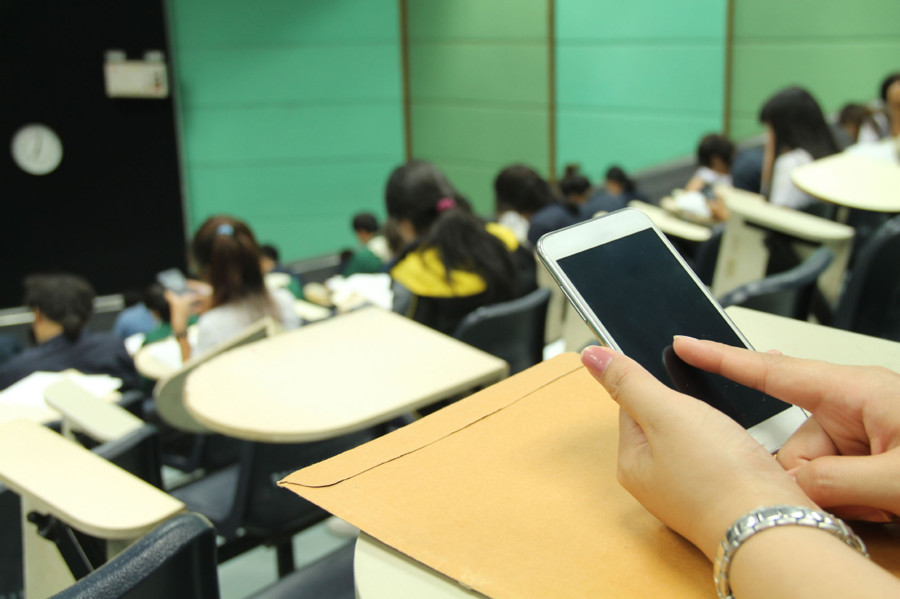Valley
In some colleges, students say teachers are going through their phones
While students decry invasion of privacy, teachers and staff say that they only do it for the protection of their students.
Sneha Dahal
In 2017, while in 11th grade at United Academy, Namita and her friend were caught using their cell phones. As cell phones were forbidden by the school’s policy, the Disciplinary Counsellor confiscated their phones, which was a regular practice and is explicitly stated on the school’s website. But then, he asked them for their phone passcodes. The girls refused at first, but the DC insisted, pressuring them into giving him their passcodes.
“He opened every single folder and app there was. He checked the call history, chat history and photo gallery,” Namita told the Post. “After coming across a photograph of my friend in a swimsuit, he said ‘wannabe model’ with a smirk.”
All of the women and men identified in this report asked that their real names not be used as they are either current students or recent graduates and fear backlash from their schools.
United Academy’s code of conduct states that “students are prohibited from bringing materials like periodicals, photographs, mobile, CD/DVDs, MP3, and other such gadgets. Motorbikes and cell phones are strictly forbidden when in college uniform. If found, they are seized and returned only after the end of the academic session.
The Post spoke to numerous students who said that administrators and teachers from a number of schools routinely confiscated phones and went through private messages and photographs without their consent. Three current and two former students related separate instances of school officials going through phones that were not password protected and demanding the passcodes for phones that were. All of the five said that they thought this was harmful to their privacy and their self-esteem.
Bipashna, a former student from GEMS School, said that she was taking pictures with her friend in her classroom when her maths teacher confiscated her iPad, which was then circulated among numerous teachers present in the staff room.
“The next day, our social studies teacher behaved strangely with us, sarcastically talking about birthday parties and making gestures of girls posing and taking selfies in a very demeaning manner while looking at us,” she said. “That’s when I knew that he had seen all the photos in the gallery of my iPad.”
The discipline section of GEMS School’s website also says, “Students are prohibited from bringing mobile phones or electronic gadgets or accessories. It will be confiscated.”
But nowhere do either GEMS or United Academy states that phones are subject to being thoroughly scanned by school officials. And even if they did, it would possibly be against the law.
Article 12 (1) of the Individual Privacy Act 2075 (2018) states that “Every person shall have the right to keep the personal data or details related to him or her confidential.” Similarly, Article 12 (2) mentions “While collecting personal or family data of any person, his or her consent shall be obtained.”
According to lawyers specialising in internet law, pressuring students to give up their phone passwords is a clear violation of the privacy law.
“A college or school can have a rule about confiscating electronic devices inside the institution’s premises, but going through a phone that isn’t password-protected without the owner’s consent or pressuring a student to give up their passcodes is a serious crime,” said Baburam Aryal, an IT lawyer.
But privacy violations are par for the course at United, said a number of students.
“This act of seizing electronic devices doesn’t just stop inside the college premises. If the college finds out that a student has a phone or any other electronic gadgets at home via social media or rumours, they even pressurise us to bring those to college and submit them,” said Isha, who is also currently a student in United Academy.
Teachers at United Academy believe that electronic gadgets are distractions, which make students less likely to focus on their studies, said Isha.
“When they seize our phones, they try to look for any photographs or a chat history that would suggest a romantic relationship. They then use that against us in front of our parents,” she said.
Pooja and Punam, both recent graduates from United Academy, told the Post over the phone that the disciplinary counsellors not only ask for phone passcodes but also force students to give them their passwords to their social media accounts like Facebook and Instagram. The counsellors were identified as Nil Kumar Maharjan and Rohit Khadka, according to one of the students.
Article 19 (1) of the Individual Privacy Act, under Chapter 9 Electronic Means and Privacy, says, “Every person shall have the right to maintain the privacy of the matter relating to any of his or her personal information, document, correspondence, data or character that remained in electronic means”.
“I have a life outside the college, I have plans to go partying, I have pictures of myself in shorts or bikinis, which I don’t necessarily want to share with others. But when the DC checked my phone, he saw all of it and made me uncomfortable,” said Pooja. “He also used my pictures and my chat history with my boyfriend to brainwash my parents into thinking I’m spoiled and that was why I wasn’t doing well in my studies.”
The Post made numerous attempts via repeated phone calls and emails to reach GEMS for a comment, but they did not reply by publication time.
Administrators at United Academy, however, said that their actions were motivated by concerns for the students’ own safety.
Nil Kumar Maharjan, the Discipline Head In-charge at United Academy, said that phones aren’t allowed inside the college premises and if found, they are seized, switched off and placed inside a locker. But he denies ever going through a student’s phone without reason.
“No student is asked their passwords unless we get complaints from other students about potential gang fights or trolling of students and teachers on social media that is harmful to their self-esteem,” said Maharjan.
According to Maharjan, there have been instances where students create fake social media accounts to troll others or to circulate photo-shopped pictures and videos of other students and even teachers.
“In such cases, we file a cybercrime case and we find out the identity of the student who put out the content,” said Maharjan. “In those cases, we ask them to open their social media in our presence and then we print out the evidence, which is later shown to their parents and is kept at the college as a record.”
Rudra Chaulagain, an administrative staff at United Academy, said he and all the disciplinary counsellors were well aware of both privacy and cybercrime laws, but denied asking students for their passcodes arbitrarily.
“We have a complete record of cases where passwords were asked,” said Chaulagain. “Once, there was an incident where a male student from United messaged a female student late at night expressing his feelings for her. That text was later seen by the girl’s boyfriend who was from another college. The boyfriend came with four to five boys and kidnapped the male student. Nil and I had to go down to the area and save the kid. After bringing him back, we asked him to type in his password to see the texts that had led to this fight.”
According to Chaulagain, there have also been incidents regarding the circulation of nude photographs among students without consent.
“The girl was devastated and so was her family. We found the guy who leaked the photo and asked him for his password. That’s how we got the evidence and he was punished,” said Chaulagain.
But Chaulagain and Maharjan both reiterated that they never go through students’ phones without a reason and always inform the parents and have written records of every time they seize a phone.
But students insist that there have been incidents where the teaching staff went through their phones without a valid reason. They also allege that United Academy administration’s invasion of students’ privacy goes well beyond the school. Sometimes, students are even asked to bring in their electronics from home and leave them at school.
Samir, a student at United Academy, was asked to submit his phone and laptop after he failed to get good grades in his exams. After being pressured for days, Samir finally submitted his phone, he said.
“One of my friends’ phone was seized and the DC asked him for the password by threatening to expel him,” Samir said. “This act of asking passwords has ruined students’ mental health and social lives. It is a clear violation of privacy.”
***
What do you think?
Dear reader, we’d like to hear from you. We regularly publish letters to the editor on contemporary issues or direct responses to something the Post has recently published. Please send your letters to [email protected] with "Letter to the Editor" in the subject line. Please include your name, location, and a contact address so one of our editors can reach out to you.




 10.12°C Kathmandu
10.12°C Kathmandu













